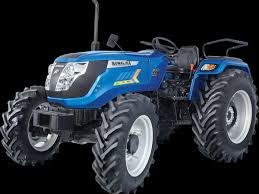Pioneering the Future of Utility Vehicles: The journey of Bullwork, identifying the problem, a vision for the future

In the wake of the COVID-19 pandemic, as the world was adapting to a new normal, three innovators—Om, Hemant, and Vinay—came together with a mission to revolutionize utility vehicles. The discussion started with a fundamental question: Which sector could benefit the most from electric vehicles (EVs)? Their research pointed them toward a critical but often overlooked segment—utility machinery used in agriculture, construction, and mining.
Dr Sriharsha Sheshanarayana, Co-founder, CTO, Bullwork, stated in an exclusive interaction with FinancialExpress.com on the sidelines of the ongoing Dassault Systèmes 3DEXPERIENCE World, annual event in the US.
According to Dr Sriharsha, traditional utility vehicles, especially tractors, are costly to operate. Farmers invest around INR 9-10 lakh to buy a tractor but spend an additional INR 4-5 lakh per year on diesel alone. Over time, this financial burden limits mechanization and modernization in the agricultural sector. The founders realized that transitioning to electric would cut operational costs by over 80%, making farming and other utility industries more cost-effective and sustainable.
Beyond cost savings, electric machinery offered another advantage: flexibility in design. Unlike diesel-powered vehicles constrained by a bulky engine and transmission system, EVs allowed for innovative architectures and automation, setting the stage for autonomous-ready solutions. The founders understood that they weren’t just solving a cost problem—they were paving the way for the future of mechanization.
Building the Foundation: The Role of SOLIDWORKS
In the early days, Bullwork joined the SOLIDWORKS startup program, which proved instrumental in kickstarting their design process. More than just a CAD tool, SOLIDWORKS provided access to cloud solutions, simulations, and a streamlined product lifecycle management (PLM) system. Having an integrated platform allowed them to rapidly prototype and refine their designs while overcoming technical challenges with support from the SOLIDWORKS team.
Diverse Expertise: The Founding Team and Strategic Partnerships
Each co-founder brought specialized knowledge to the table. Om, with a PhD in aerospace engineering from Queen’s University Belfast, had expertise in structures, controls, and robotics. Hemant, a veteran in the EV space, had worked with Ather and Ola Electric, bringing crucial industry experience. Vinay, an expert in heavy machinery design, had an in-depth understanding of hydraulics and large-scale mechanical systems.
Recognizing the importance of market penetration, Bullwork strategically partnered with Multiplex Group, a 50-year-old company with deep roots in the agricultural sector. Multiplex’s CEO, Mahesh Shetty, became an investor and co-founder, leveraging his expertise in agricultural marketing and distribution to bridge the gap between cutting-edge technology and end users.
Game-Changing Products: Electric Tractors and More
Bullwork’s flagship product, an electric tractor, is set to launch this year as a fully certified machine. But their innovations didn’t stop there. Through their work with Multiplex, they identified other agricultural challenges, such as the need for efficient pesticide spraying. This led to the development of the world’s first fully electric boom sprayer—a high-clearance machine capable of covering one acre in just three minutes.
Their impact extended beyond agriculture. Last year at Excon Bangalore, Bullwork introduced the GLX Skid Steer Loader, a compact and multi-functional construction vehicle popular in the West but underutilized in India. With its fully electric design, it promises to be a game-changer in the domestic market.
Automation and the Future of Rural Mechanization
One of Bullwork long-term goals is to develop autonomous farming solutions. Tasks like tilling and spraying follow repetitive patterns, making them ideal for automation. However, rural India faces a shortage of skilled labour, which hinders mechanization efforts. By integrating autonomous systems into their electric machinery, Bullwork aims to bridge this gap, making farming easier and more efficient.
Additionally, according to Dr Sriharsha the transition to electric tractors makes them more accessible to women. Traditional tractors, with their 12-16 gear transmission and heavy hydraulic controls, are challenging to operate, he explained. Bullwork’s drive-by-wire system simplifies controls, reducing manual effort and making mechanization more inclusive.
Funding and Scaling Up
With multiple late-stage products ready for commercialization, the Bangalore based Bullwork is currently raising its first funding round of $10 million. These funds will help scale production, particularly for the high-volume electric tractor segment. While their flexible assembly line can handle small batches, large-scale production will require further investment in infrastructure.
Challenges and Opportunities: The Battery Dilemma
One major challenge in EV adoption is battery cost. While lithium-ion batteries are expensive, the company has plans to approach the issue from a total cost of ownership perspective. “A traditional diesel tractor may cost Rs 10 lakh upfront, but over five years, fuel and maintenance push the total cost to Rs 35-40 lakh. In contrast, an electric tractor—despite its higher initial cost—is far cheaper to operate, reducing total costs to around Rs 20 lakh over the same period,” he said.
Additionally, they are exploring battery leasing models, similar to MG’s partnership with Windsor in the automotive sector. With government incentives and the expected price drop in battery technology, the transition to electric tractors is set to become more feasible. “The Indian government projects that by 2029, 15% of all tractors sold will be electric—roughly 1.5 lakh units annually,” he added.
The Road Ahead
The company is not just building electric tractors; they are pioneering a transformation in utility vehicles. “By reducing operational costs, enhancing accessibility, and integrating automation, we are positioning ourselves at the forefront of India’s electric revolution. With strategic partnerships, cutting-edge technology, and a clear vision, Bullwork is set to redefine mechanization in agriculture and beyond.”

